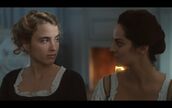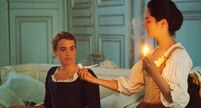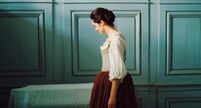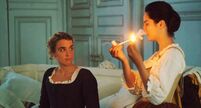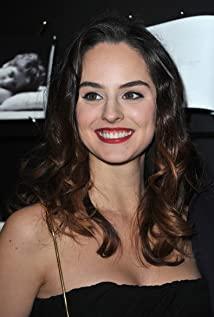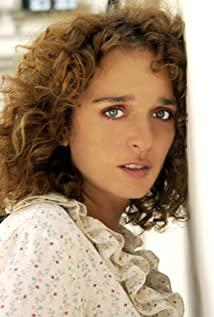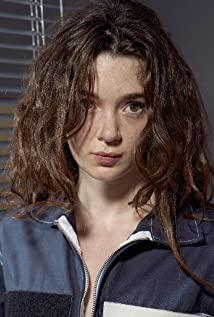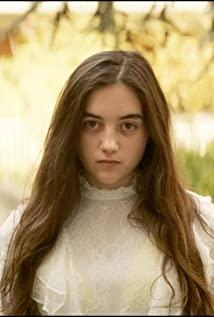----------------SPOILER ALERT-------------------
This question is Miss Heloise asking the painter Marianne: Do you know when I first wanted to kiss you. The painter replied that it was at the bonfire (the lady was still staring at the painter with her skirt on, who can't tell what the lady was thinking? Hello), the answer was denied by the lady, and then the artist said that the maid was hanging and trying to abort the child, the lady asked When the painter experienced love, the painter answered the question again while lying on the bed: The time when I understand love is the time when you asked me. And the lady said: I remember. This is not a definite answer.
So, when exactly is it?
This article attempts to deduce the answer to the question through various evidences in the mentality of a little detective (the following may be considered by some people to be subjective over-interpretation, mind reading carefully)
Let's list the evidence layer by layer (it's actually very simple, just three)
1. In order to paint the young lady, the painter at the beginning stared at her and observed her, and the unsuspecting young lady may think that the artist stared at her because she thought she was beautiful or liked her. did this). Later, when the lady knew the truth, she said: This explains why you look at me like this. It turns out that the lady at the beginning will be wrong. So the young lady fell in love with the artist before she revealed her identity.
2. Regarding the painter's sexual orientation, there is a foreshadowing in the conversation between the two about marriage on the beach. The painter said that she did not know whether she would get married or not, and she wanted to inherit her father's career. The lady said that the painter had a choice, so she did not understand herself. And the painter replied, I understand you. The implication is that the painter has no choice. The subtext may be: I don't want to get married, but I can't because I like girls. Moreover, the expression of the painter here is not resentment, such as being asked by his father to inherit his father's business, but fear and helplessness. So the painter fell in love with her in the process of staring at the young lady and walking with the young lady in the morning.
3. The young lady came to find the painter, and the two sat by the piano. The young lady stared straight at the painter. At the beginning of the painter playing the piano, she didn't even look at the piano. She just stared at the painter's face and smiled. The lady pulls back to reality. Before the film, the lady had never seen the painter like this. And the young lady is not looking for the painter to go out for a walk, but simply to find her, so I think this should be the first time when the young lady wants to kiss the painter.
Then there are two supporting evidences
a. Before my mother left, she told the painter: Miss likes you very much, and told me about you. The foreshadowing in front of the plot is because of the mother's decision, so there should be a estrangement between the young lady and her mother, and at this time, she is willing to take the initiative to talk about the painter and explain that she has fallen in love with her before, and the two discussed love after the mother left. (I share a little personal experience here: when I and my female friend didn’t know each other for a long time, the female friend and my roommate often talked about me and said that they liked hanging out with me very much, so the roommate asked her half-jokingly if she was I fell in love with me, and then I woke up the dreamer with a word, she has been my girlfriend for five years, and the proof is complete.)
b. After the painter confessed to the young lady, the young lady and the artist went back to see the painting. The faces of the young lady confronting the artist were not only the anger of being deceived, but also the sadness of being deceived by the person she liked (the red eye looks so pitiful). Personally, I think that the two people here have already expressed their feelings for each other, which means that they have fallen in love with each other before here. So the painter ruined the painting and left it for a while, and the lady was also willing to pose. The next plot is the two of you and me.
To sum up, I didn't run away when I played the piano.
After answering this question, there are still a few small foreshadowings that can be picked up
1. Whose child of the maid is: The men mentioned in the movie who have been to the lady's house are boatmen except for the last painter. The painter was tortured by the young lady and ran away, so there shouldn't be anything happening with the servant in the middle. And the boatman comes to pick up people and deliver things every three days. At the end of the movie, the boatman sits on the table to eat, so it is possible that the boatman often eats at home, and he goes to and fro with the maid to have something. And it is obvious that the maid and the boatman are very familiar, and the boatman is also used to the food the maid prepares for her. The maid is a little unhappy when serving the boatman, so I think the boatman is probably the father of the child.
2. The painter has had a child: When the maid tried her best to have a miscarriage, the lady asked the painter if you had experienced this too, the painter answered yes, and then asked if he had ever experienced love at home, the artist answered yes, on the surface it should be the painter There are also men who fall in love and have children. But according to the following plot, what the painter actually said on the issue of love is not that she loves the person who made her pregnant, and then the process of the maid's abortion, the painter did not dare to look at it, maybe she couldn't bear to recall the pain she had experienced. At this time, the lady hoped that the painter could get out of this experience, so she asked the painter to look at the maid, and then asked the painter to draw the process of abortion and face her scars.
3. Why did the painter see Miss's vision: I didn't understand it at first, but after reading the director's interview, Celine said that because the film combines the two timelines of the painter's class with the students and the story of the lady and the painter. So it should be the painter who is telling the story of her and the young lady to the students. The stories of the two people shown in the film are memories, and in the illusory memories, the illusion of the young lady wearing a wedding dress in the painter's memory will appear many times. It may also be a story telling. When I got there, the painter remembered the young lady again and again, so there was an illusion in the film (memory). Later, the painter told the students that I had given up, and the strange and uncomfortable eyes the students looked at her should also indicate that she told the students their stories. (Actually, I thought at first that this story should not have been told at that time, so I couldn’t understand the illusion)
4. Paintings of Orpheus: At the end of the exhibition, a man said that the paintings he had seen before depicting Orpheus and his wife were all suffering, and the painter painted them as if they were saying goodbye. The background of Orpheus and his wife in the painting by the artist is the beach at the lady's house, and the clothes on his wife are very similar to the lady's wedding dress, so this painting should also be painted by the artist to commemorate the story of her and the lady.
5. Remember, don't regret: This is on the eve of her departure. The lady told the painter that she regretted not starting. The painter said this to comfort her. This sentence is also explained in explaining the story of Orpheus. One of the painter and the young lady said that Oedipus turned back because he loved his wife so much that he made the poet's decision rather than the husband's decision, and the other said that it might be his wife who let him "turn around" and let him remember her likeness. All emphasize Orpheus's remembering of his wife. Then when the painter left, the lady's phrase "turn around" is also an intertext of Orpheus' story. (Director Celine said that the idea of this story was added to the script at the end, and the story was adapted in the movie.) Later, the painter saw the portrait of the young lady at the art exhibition. On page 28 of the book, the young lady was married and had children, Still remember the attestation of the painter.
6. Four Seasons-Summer: One of the few pieces of music that appears in the film, one is the tune played by the painter in front of the piano for the young lady, and the other is the final scene. When the painter was playing the piano, the first few notes were Xia's first movement. Later, after the lady came over, the painter played the third movement, and the painter said it was a very vibrant piece. But in fact, Vivaldi wrote the third movement in the sonnet for "Summer": Finally, what he feared happened - the violent storm and hail of thunder and lightning blocked his way home .
7. About the last shot: At the Cannes Film Festival press conference, a reporter asked Adele and Noemie what they would do if the last two saw each other. Adele replied: I don't know, this is each audience's own story, maybe each person continuous living with the other.
In the end, the film was tailor-made for Adele by director Celine. In various interviews, Adele also said that this story was for her, and she did not participate in the Audition (the default heroine). Celine also really loves Adele. She can always shoot the most beautiful Adele. She also found someone to draw so many portraits for her. Probably after the shooting, Celine and Adele will take these paintings home and collect them separately.
Finally, a gossip, it may also be my YY. Since the Cannes Film Festival in May 2019, Noemie has a ring on her left ring finger, and she has been wearing it all the time. There are many photos of her and a male director named Simon on the Internet. There are also comments that Noemie married at an early age, but Wikipedia , IMDB and other websites do not have a stone hammer, it may be that she is really married and her privacy is well protected. However, Noemie's ring was gone when they went to the golden globe in January and the next few meetups in the US. . . I don't know what this means (CP fans laughed)
In the end, back to the movie, there is a question that I haven't figured out for a while, and I hope God can answer it: Why do you mention whether the young lady can swim twice? The painter said that I will leave tomorrow, and the lady said that I am going to swim today, so what does that mean?
above
I haven’t read a few other people’s film reviews before writing this. If there are any similarities, it’s purely coincidental. You are welcome to discuss and correct me. Anyway, I’m a cp fan.
View more about Portrait of a Lady on Fire reviews



